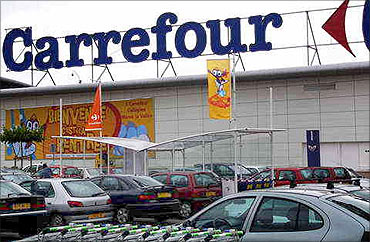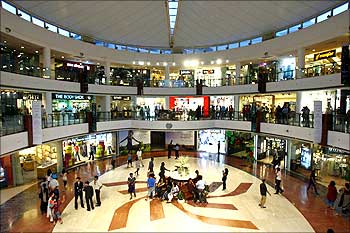 | « Back to article | Print this article |
Why FDI norms in retail don't make sense
Consumer liberation", "Improved choices for consumer" and so on were headlines screaming from some of the leading dailies.
In case one wondered what momentous event warranted such sentiment, just a day before the Committee of Secretaries had recommended guidelines for allowing Foreign Direct Investment in multi-brand retail.
Though the promised liberation is still some time away, our lives may be more meaningful in the future with the choice of 40 flavours of tomato sauce and such that will then come our way.
The base case for the proposed FDI guidelines is that it dramatically improves the investment in back-end infrastructure, supply chain and so on apart from lowering prices.
Click NEXT to read more...
Why FDI norms in retail don't make sense
Now that the committee of wise men has spoken, let us critically look at the key aspects of their recommendations.
If the controlling stake can be foreign, what is the logic for the 51 per cent limit and not allowing 100 per cent ownership? Is there some strategic national interest that is protected if 49 per cent owner of a multi-brand retail enterprise is an Indian body?
Or is it that by imposing such a cap we help transform many existing withering domestic players into attractive damsels for the foreign suitor?
Click NEXT to read more...
Why FDI norms in retail don't make sense
Why not give foreign investors, who we so keenly seek, a clean slate with 100 per cent ownership to build the business as they desire, without forcing on them a domestic investor or partner.
It is mentioned that a $100 million minimum FDI limit is prescribed. I cannot but wonder what business or commercial logic drove us to arrive at this amount other than it being a nice round figure.
On its own this can seem a reasonable investment. However, if the intent is to ensure only serious participants and FDI to build significant retail infrastructure, these numbers seem rather pusillanimous.
Click NEXT to read more...
Why FDI norms in retail don't make sense
To build any meaningful scale they need to set up 40-50 hypermarkets, five to 600 supermarkets and so on in a reasonable time frame of, say, three to five years.
The split of outlets by format may vary based on the player but the implication on investments is reasonably similar.
For these stores they will need at least four million sq ft of real estate across our top cities.
Even in a leasing model this needs $40-50 million for just rental deposits, let alone it's fit out.
Click NEXT to read more...
Why FDI norms in retail don't make sense
My submission is that we have possibly pegged the FDI limit of $100 million way lower than it could have been (it could well be in the region of $250-300 million for food retail). According to this rider, $50 million becomes the commitment for investment in the back end.
Again, as with the FDI floor of $100 million, these numbers are insignificant to build any meaningful pan-India warehousing, cold store and transportation infrastructure.
Click NEXT to read more...
Why FDI norms in retail don't make sense
Why include impractical conditions like this that can be open to interpretation and are difficult to implement?
On the one hand, we want to give consumers improved choice with FDI, but on the other, we propose to limit the retailer's sourcing options.
Would not a minimum percentage of purchase from domestic manufacturer suffice? I hear that since this condition may fall foul of the World Trade Organisation norms, it may, anyway, undergo change before seeing the light of day.
Click NEXT to read more...
Why FDI norms in retail don't make sense
According to the 2011 census, India has 50 cities with over one million population accounting for about 140 million of our population.
They possibly also contribute to 55-57 per cent of urban domestic consumption. It is these cities with the concentration of purchasing power that are on the radar of global retailers.
Click NEXT to read more...
Why FDI norms in retail don't make sense
Even if the government were to not impose any such restriction, I can bet that none of them are likely to head to cities with less than one million population for many years.
Accused of policy paralysis, the government seems to have picked FDI in retail as a clarion call to dispel this notion. We seem to make tame recommendations for issues - like the level of foreign investment, infrastructure and so on - on which we should have robust norms.
At the same time, by also adding other inconsequential riders, we end up with guidelines that may neither enthuse the foreign investor nor placate domestic opposition.
To conclude, I must say the draft guidelines remind me of a famous line by Sir Walter Scott: "Oh, what a tangled web we weave when first we practice to deceive".
The author is a Bangalore-based independent corporate advisor








